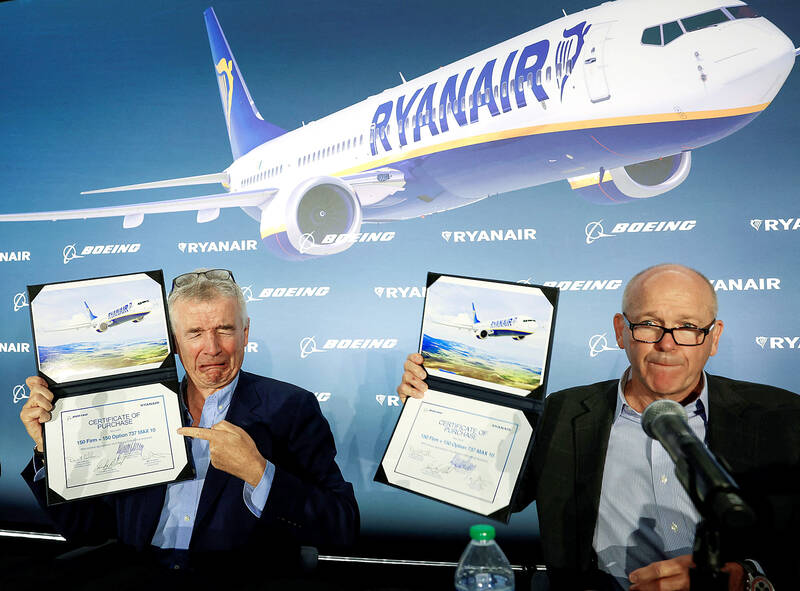Irish airline Ryanair Holdings PLC on Tuesday ordered 300 Boeing Co 737 Max jets with a list price of more than US$40 billion, representing the US aerospace giant’s latest big contract in a fast-recovering aviation market.
The announcement, comprising 150 firm orders plus 150 options for new fuel-efficient aircraft, represents “the largest order ever placed by an Irish company for US manufactured goods,” Ryanair said in a statement, as it is eyeing big growth over the next decade.
The jets are set for delivery between 2027 and 2033. Airlines traditionally negotiate substantial discounts on list prices, especially for big orders.

Photo: Reuters
Executives did not release the financial details of the transaction, but Ryanair chief executive Michael O’Leary described the agreement as a “win-win” in an interview held jointly with Boeing chief executive Dave Calhoun.
The Dublin-based carrier said the deal would be subject to shareholder approval at its annual general meeting in September, owing to the size and scale of the transaction.
The order covers Boeing’s new 737 Max-10 aircraft, which have 228 seats, about 20 percent more than the current generation of comparable Boeing jets, O’Leary said.
At a signing event at Boeing’s Arlington, Virginia, headquarters, O’Leary said that the new aircraft “boast lower costs” that would be passed on “in the form of lower airfares, therefore driving our growth.”
Ryanair added that the new 228-seater jets, alongside a major recruitment drive, would help facilitate a surge in passenger numbers.
The carrier, which specializes in competitively priced short and medium-distance trips within Europe, is targeting an 80 percent jump in annual passenger traffic to 300 million travelers by 2034, compared with this year.
It plans to recruit more than 10,000 new cabin crew members, engineers and pilots to help meet the goal. The company hopes to garner a 30 percent share of the European market.
The deal is the latest lift for Boeing, which is emerging from a major slump due to the COVID-19 downturn and the lengthy grounding of the 737 Max after two fatal crashes.
Calhoun said he was confident that Boeing would meet the terms of the contract.
When Boeing presented its long-term outlook in November last year, the US manufacturer anticipated the logistics difficulties that have dogged the industry during the COVID-19 pandemic would improve this year and next year.
“And that is what’s been happening,” Calhoun said on Tuesday.
He also characterized the US Federal Aviation Administration’s certification process for the Max-10 as on track.
“No technical issues have arisen such that there’s a concern that we won’t be able to resolve,” Calhoun said.
“It’s documentation, documentation, documentation,” he said.

BYPASSING CHINA TARIFFS: In the first five months of this year, Foxconn sent US$4.4bn of iPhones to the US from India, compared with US$3.7bn in the whole of last year Nearly all the iPhones exported by Foxconn Technology Group (富士康科技集團) from India went to the US between March and last month, customs data showed, far above last year’s average of 50 percent and a clear sign of Apple Inc’s efforts to bypass high US tariffs imposed on China. The numbers, being reported by Reuters for the first time, show that Apple has realigned its India exports to almost exclusively serve the US market, when previously the devices were more widely distributed to nations including the Netherlands and the Czech Republic. During March to last month, Foxconn, known as Hon Hai Precision Industry

Taiwan Semiconductor Manufacturing Co (TSMC, 台積電) and the University of Tokyo (UTokyo) yesterday announced the launch of the TSMC-UTokyo Lab to promote advanced semiconductor research, education and talent development. The lab is TSMC’s first laboratory collaboration with a university outside Taiwan, the company said in a statement. The lab would leverage “the extensive knowledge, experience, and creativity” of both institutions, the company said. It is located in the Asano Section of UTokyo’s Hongo, Tokyo, campus and would be managed by UTokyo faculty, guided by directors from UTokyo and TSMC, the company said. TSMC began working with UTokyo in 2019, resulting in 21 research projects,

Ashton Hall’s morning routine involves dunking his head in iced Saratoga Spring Water. For the company that sells the bottled water — Hall’s brand of choice for drinking, brushing his teeth and submerging himself — that is fantastic news. “We’re so thankful to this incredible fitness influencer called Ashton Hall,” Saratoga owner Primo Brands Corp’s CEO Robbert Rietbroek said on an earnings call after Hall’s morning routine video went viral. “He really helped put our brand on the map.” Primo Brands, which was not affiliated with Hall when he made his video, is among the increasing number of companies benefiting from influencer

Quanta Computer Inc (廣達) chairman Barry Lam (林百里) yesterday expressed a downbeat view about the prospects of humanoid robots, given high manufacturing costs and a lack of target customers. Despite rising demand and high expectations for humanoid robots, high research-and-development costs and uncertain profitability remain major concerns, Lam told reporters following the company’s annual shareholders’ meeting in Taoyuan. “Since it seems a bit unworthy to use such high-cost robots to do household chores, I believe robots designed for specific purposes would be more valuable and present a better business opportunity,” Lam said Instead of investing in humanoid robots, Quanta has opted to invest